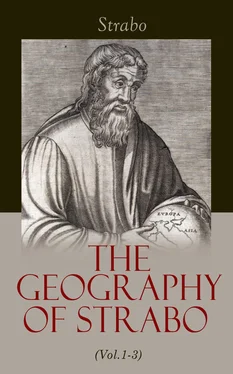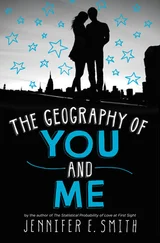Strabo - The Geography of Strabo (Vol.1-3)
Здесь есть возможность читать онлайн «Strabo - The Geography of Strabo (Vol.1-3)» — ознакомительный отрывок электронной книги совершенно бесплатно, а после прочтения отрывка купить полную версию. В некоторых случаях можно слушать аудио, скачать через торрент в формате fb2 и присутствует краткое содержание. Жанр: unrecognised, на английском языке. Описание произведения, (предисловие) а так же отзывы посетителей доступны на портале библиотеки ЛибКат.
- Название:The Geography of Strabo (Vol.1-3)
- Автор:
- Жанр:
- Год:неизвестен
- ISBN:нет данных
- Рейтинг книги:3 / 5. Голосов: 1
-
Избранное:Добавить в избранное
- Отзывы:
-
Ваша оценка:
- 60
- 1
- 2
- 3
- 4
- 5
The Geography of Strabo (Vol.1-3): краткое содержание, описание и аннотация
Предлагаем к чтению аннотацию, описание, краткое содержание или предисловие (зависит от того, что написал сам автор книги «The Geography of Strabo (Vol.1-3)»). Если вы не нашли необходимую информацию о книге — напишите в комментариях, мы постараемся отыскать её.
The Geography of Strabo (Vol.1-3) — читать онлайн ознакомительный отрывок
Ниже представлен текст книги, разбитый по страницам. Система сохранения места последней прочитанной страницы, позволяет с удобством читать онлайн бесплатно книгу «The Geography of Strabo (Vol.1-3)», без необходимости каждый раз заново искать на чём Вы остановились. Поставьте закладку, и сможете в любой момент перейти на страницу, на которой закончили чтение.
Интервал:
Закладка:
10. Homer, besides the boundaries of the earth, which he fully describes, was likewise well acquainted with the Mediterranean. Starting from the Pillars, 28this sea is encompassed by Libya, Egypt, and Phœnicia, then by the coasts opposite Cyprus, the Solymi, 29Lycia, and Caria, and then by the shore which stretches between Mycale 30and Troas, and the adjacent islands, every one of which he mentions, as well as those of the Propontis 31and the Euxine, as far as Colchis, and the locality of Jason’s expedition. Furthermore, he was acquainted with the Cimmerian Bosphorus, 32having known the Cimmerians, 33and that not merely by name, but as being familiar with themselves. About his time, or a little before, they had ravaged the whole country, from the Bosphorus to Ionia. Their climate he characterizes as dismal, in the following lines:—
“With clouds and darkness veil’d, on whom the sun
Deigns not to look with his beam-darting eye,
*******
But sad night canopies the woeful race.” 34
He must also have been acquainted with the Ister, 35since he speaks of the Mysians, a Thracian race, dwelling on the banks of the Ister. He knew also the whole Thracian 36coast adjacent thereto, as far as the Peneus, 37for he mentions individually the Pæonians, Athos, the Axius, 38and the neighbouring islands. From hence to Thesprotis 39is the Grecian shore, with the whole of which he was acquainted. He was besides familiar with the whole of Italy, and speaks of Temese 40and the Sicilians, as well as the whole of Spain 41and its fertility, as we have said before. If he omits various intermediate places this must be pardoned, for even the compiler of a Geography overlooks numerous details. We must forgive him too for intermingling fabulous narrative with his historical and instructive work. This should not be complained of; nevertheless, what Eratosthenes says is false, that the poets aim at amusement, not instruction, since those who have treated upon the subject most profoundly, regard poesy in the light of a primitive philosophy. But we shall refute Eratosthenes 42more at length, when we have occasion again to speak of Homer.
11. What we have already advanced is sufficient to prove that poet the father of geography. Those who followed in his track are also well known as great men and true philosophers. The two immediately succeeding Homer, according to Eratosthenes, were Anaximander, the disciple and fellow-citizen of Thales, and Hecatæus the Milcsian. Anaximander [Pg 12]
[Pg 13] was the first to publish a geographical chart. Hecatæus left a work [on the same subject], which we can identify as his by means of his other writings.
12. Many have testified to the amount of knowledge which this subject requires, and Hipparchus, in his Strictures on Eratosthenes, well observes, “that no one can become really proficient in geography, either as a private individual or as a professor, without an acquaintance with astronomy, and a knowledge of eclipses. For instance, no one could tell whether Alexandria in Egypt were north or south of Babylon, nor yet the intervening distance, without observing the latitudes. 43Again, the only means we possess of becoming acquainted with the longitudes of different places is afforded by the eclipses of the sun and moon.” Such are the very words of Hipparchus.
13. Every one who undertakes to give an accurate description of a place, should be particular to add its astronomical and geometrical relations, explaining carefully its extent, distance, degrees of latitude, and “climate.” 44Even a builder before constructing a house, or an architect before laying out a city, would take these things into consideration; much more should he who examines the whole earth: for such things in a peculiar manner belong to him. In small distances a little deviation north or south does not signify, but when it is the whole circle of the earth, the north extends to the furthest confines of Scythia, 45or Keltica, 46and the south to the extremities of Ethiopia: there is a wide difference here. The case is the same should we inhabit India or Spain, one in the east, the other far west, and, as we are aware, the antipodes 47to each other.
14. The [motions] of the sun and stars, and the centripetal force meet us on the very threshold of such subjects, and compel us to the study of astronomy, and the observation of such phenomena as each of us may notice; in which too, very considerable differences appear, according to the various points of observation. How could any one undertake to write accurately and with propriety on the differences of the various parts of the earth, who was ignorant of these matters? and although, if the undertaking were of a popular character, it might not be advisable to enter thoroughly into detail, still we should endeavour to include every thing which could be comprehended by the general reader.
15. He who has thus elevated his mind, will he be satisfied with any thing less than the whole world? If in his anxiety accurately to portray the inhabited earth, he has dared to survey heaven, and make use thereof for purposes of instruction, would it not seem childish were he to refrain from examining the whole earth, of which the inhabited is but a part, its size, its features, and its position in the universe; whether other portions are inhabited besides those on which we dwell, and if so, their amount? What is the extent of the regions not peopled? what their peculiarities, and the cause of their remaining as they are? Thus it appears that the knowledge of geography is connected with meteorology 48and geometry, that it unites the things of earth to the things of heaven, as though they were nearly allied, and not separated.
“As far as heaven from earth.” 49
16. To the various subjects which it embraces let us add natural history, or the history of the animals, plants, and other different productions of the earth and sea, whether serviceable or useless, and my original statement will, I think, carry perfect conviction with it.
That he who should undertake this work would be a benefactor to mankind, reason and the voice of antiquity agree. The poets feign that they were the wisest heroes who travelled and wandered most in foreign climes: and to be familiar with many countries, and the disposition of the inhabitants, is, according to them, of vast importance. Nestor prides himself on having associated with the Lapithæ, 50to whom he went, “having been invited thither from the Apian 51land afar.”
So does Menelaus:—
“Cyprus, Phœnicia, Sidon, and the shores
Of Egypt, roaming without hope I reach’d;
In distant Ethiopia thence arrived,
And Libya, where the lambs their foreheads show
With budding horns defended soon as yean’d.” 52
Adding as a peculiarity of the country,
“There thrice within the year the flocks produce.” 53
And of Egypt:—“Where the sustaining earth is most prolific.” 54And Thebes,
“the city with an hundred gates,
Whence twenty thousand chariots rush to war.” 55
Such information greatly enlarges our sphere of knowledge, by informing us of the nature of the country, its botanical and zoological peculiarities. To these should be added its marine history; for we are in a certain sense amphibious, not exclusively connected with the land, but with the sea as well. Hercules, on account of his vast experience and observation, was described as “skilled in mighty works.” 56
All that we have previously stated is confirmed both by the testimony of antiquity and by reason. One consideration however appears to bear in a peculiar manner on the case in point; viz. the importance of geography in a political view. For the sea and the earth in which we dwell furnish theatres for action; limited, for limited actions; vast, for grander deeds; but that which contains them all, and is the scene of the greatest undertakings, constitutes what we term the habitable earth; and they are the greatest generals who, subduing nations and kingdoms under one sceptre, and one political administration, have acquired dominion over land and sea. It is clear then, that geography is essential to all the transactions of the statesman, informing us, as it does, of the position of the continents, seas, and oceans of the whole habitable earth. Information of especial interest to those who are concerned to know the exact truth of such particulars, and whether the places have been explored or not: for government will certainly be better administered where the size and position of the country, its own peculiarities, and those of the surrounding districts, are understood. Forasmuch as there are many sovereigns who rule in different regions, and some stretch their dominion over others’ territories, and undertake the government of different nations and kingdoms, and thus enlarge the extent of their dominion, it is not possible that either themselves, nor yet writers on geography, should be equally acquainted with the whole, but to both there is a great deal more or less known. Indeed, were the whole earth under one government and one administration, it is hardly possible that we should be informed of every locality in an equal degree; for even then we should be most acquainted with the places nearest us: and after all, it is better that we should have a more perfect description of these, since, on account of their proximity, there is greater need for it. We see there is no reason to be surprised that there should be one chorographer 57for the Indians, another for the Ethiopians, and a third for the Greeks and Romans. What use would it be to the Indians if a geographer should thus describe Bœotia to them, in the words of Homer:—
Читать дальшеИнтервал:
Закладка:
Похожие книги на «The Geography of Strabo (Vol.1-3)»
Представляем Вашему вниманию похожие книги на «The Geography of Strabo (Vol.1-3)» списком для выбора. Мы отобрали схожую по названию и смыслу литературу в надежде предоставить читателям больше вариантов отыскать новые, интересные, ещё непрочитанные произведения.
Обсуждение, отзывы о книге «The Geography of Strabo (Vol.1-3)» и просто собственные мнения читателей. Оставьте ваши комментарии, напишите, что Вы думаете о произведении, его смысле или главных героях. Укажите что конкретно понравилось, а что нет, и почему Вы так считаете.












![Anne Blunt - A Pilgrimage to Nejd, the Cradle of the Arab Race. Vol. 2 [of 2]](/books/750183/anne-blunt-a-pilgrimage-to-nejd-the-cradle-of-the-thumb.webp)